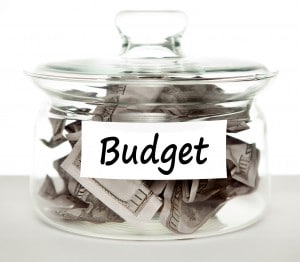The word “budget” sparks many different emotions.
Some people swear by their budget.

And others swear they had a budget, though they can’t seem to remember exactly what’s in it or where it’s at.
You used to be hard-pressed to find a finance book that didn’t recommend budgeting, but things have changed.
Several finance teachers, like Ramit Sethi and David Chilton, have started to move away from the “everyone needs a budget” mindset, and for good reason.
They focus more on big savings and less on fewer lattes.
Today, I’m going to show you both sides.
Here’s why I swear by my budget, and why you don’t need one to be financially successful.
This is Why I Budget
I admit it. I don’t follow every part of my budget, precisely, every month.
I’ve fallen off the budget train many times, but I’ve always hopped back on, and not for the reasons you may think.
I don’t budget to invest more, save more or spend less, though it does allow me to all of those things.
I budget for the sake of freedom.
I know that I can buy everything in my budget, when I spend every cent on paper before the month starts.
That means I never feel guilty about spending $50 to $200 a month on myself, as part of my “blow fund.”
I don’t feel guilty buying a new shirt when I have the clothing fund.
I don’t feel guilty when I’m eating out, because I know my limits, according to my budget.
Most of all, I never wonder if I spent more than I earned, because I spent everything on paper first.
I also budget because I recognise that there are three costs associated with every purchase, as Rory Vaden points out in his new book, Procrastinate on Purpose:
- Actual Cost – The amount you actually pay. (Example: $3 for a cup of coffee.)
- Opportunity Cost – What you gave up by buying something. (Example: $3 invested for retirement.)
- Hidden Cost – The potential return you could have earned. (Example: $3 invested over 40 years with an 8% return equals $65.17.) I hope that $65 cup of coffee was good.
To me, this shows just how important it is to save a few bucks here and there on small things, because small wins can equal big wins when compound interest is involved.
And I’m not saying you shouldn’t buy that cup of coffee.
I’m simply saying that your small purchases matter more than you think.
I’m a finance nerd, so it’s hard to justify not budgeting when I see how much of a difference a $3 purchase can make, but you may feel differently.
You may hate budgeting.
If so, welcome to the majority!
Here’s the good news for you…
This is Why You Don’t Have to Budget
You can be very successful without ever setting a budget.
How so? 
By taking care of the important matters first, and then spending the rest.
Of course, you can’t spend money you don’t have or you’ll go into debt and you could ruin everything.
So if you take this approach, I suggest pulling out your monthly spending cash so you’ll know when you’re out of money.
You could call this the Minimal Money Management system.
You plan enough on the front end that you don’t have to worry about the back end.
So what are the important matters?
Well, aside from paying off all your debt and having a fully funded emergency fund (3-6 months of living expenses on a bare bones lifestyle), there are a few things that you need to take care of.
If you will set these things to automatically come off the top of your income, you will be set up for success, and you can freely spend the rest of your money on whatever you want…yes, you can buy that nice jacket or those yard gnomes you’ve been eyeing, but once you’re out of money for the month, you still have to stop spending.
So make sure you can pay for things like food and fuel before you get too attached to those sexy yard gnomes.
First, read my article on budget automation, especially if you have debt, and then follow the process below.
Here’s the foundation that allows you to “spend the rest.” Make sure you’re doing these things first:
- Invest 15% for retirement – After your debt is paid off and your emergency fund is fully funded, set up an automatic draft for 15% of your paycheck to go into retirement investing. (See our free Investing Guide)

- Life Insurance – Buy the appropriate type and amount of life insurance. (See Understanding Life Insurance)
- Other Insurance – Hold enough health, disability, auto and home insurance to cover the things that you can’t afford to replace (including your health). If you have a lot of assets, consider an umbrella insurance policy.
- Create a will – It’s important to know what’s going to happen after you die. If you have stuff, you need a will.
- Save for large purchases – There are always large purchases in the future. You may need a new-to-you car or a down payment for a home. Whatever it is, save an amount every month for this. If you don’t need the money for at least five years, go with some index funds. If you need it before that, go with bonds or a money market account. The important thing is to save.
- Give 10% – This is optional, but In truly believe that giving is the foundation of receiving, and that your finances will never be fully blessed without this piece of the puzzle. Give to your local church or your favourite charity – the important thing isn’t where you give, but that you give.
If you have all of those areas covered, you will be financially successful.
Even without a budget.
The bottom line:
Pay yourself and make sure you’re protected first, then spend the rest.
If you’re looking for more ways to budget without budgeting, Trent Hamm wrote a great piece on alternative budgeting methods.
I would argue that you will be more prosperous if you include a budget in your planning, but if it stresses you out and makes you crazy, it’s not worth it.
After all, budgets aren’t for everyone.















